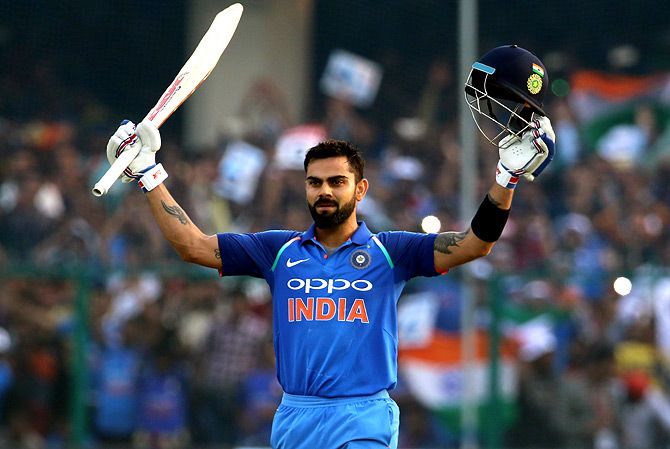While it is difficult to put a number on how much the impact on the ad sales tally could be, it is quite possible the broadcaster will not be able to make its Rs 2-billion target, says Urvi Malvania.

The absence of Indian cricket team captain Virat Kohli is expected to put a dent in broadcaster Star India’s advertisement revenue projections from the ongoing Asia Cup.
Media buyers in the know say that while it is difficult to put a number on how much the impact on the ad sales tally could be, it is quite possible the broadcaster will not be able to make its Rs 2-billion target.
The broadcaster holds the television and digital media rights to the tournament and was targeting a total of Rs 2.5 billion in ad sales revenues -- Rs 2 billion from TV and Rs 500 million from digital ad sales.
It had sold 60-70 per cent of its total advertising inventory before the start of the tournament, amounting to around Rs 1.2 billion in ad revenues. The broadcaster was hoping to cash in on the higher spot (last-minute buys) rates to complete its target of Rs 2 billion in TV ad sales.
However, with Kohli missing in action, the spot rates for the remaining 40 per cent inventory will be affected.
"There is evidence that when Kohli comes to bat, viewership moves up and when he gets out, it comes down. The fence-sitters may have one more reason to stay out because of the news," says Vineet Sodhani, chief executive officer, Spatial Access, a media audit agency.
He explains that while people will still watch the matches in the tournament, especially the India matches, the incremental reach that Kohli brings when he is on the field, will not be achieved. This may give the fence-sitters reason to not pay big bucks for the remaining inventory.
Existing advertisers, however, have no option but to go ahead with their investment, so no advertiser is pulling out of the tournament as such.
Sponsors of the Asia Cup include Hero, Byju’s, Google, Britannia, Gra-Do, Droom, Coca-Cola, USL, Domino’s, Unimoni, GSK, Dell, Eureka Forbes, MP Birla, UltraTech, Apollo Tyres, Vini Cosmetics, Parle Agro, and Nerolac.
Star India was hoping to make up to Rs 600,000 per 10-second ad spot during the series and anywhere between Rs 1 million and Rs 1.3 million for the India-Pakistan tie.
However, this will need to be revised, and it is more likely to make Rs 400,000 to Rs 450,000 per 10 seconds on an average for the tournament, while the India-Pakistan tie would fetch them Rs 800,000 to Rs 900,000 for 10 seconds.
“India is yet to play a single match in the series and its first match is against Hong Kong."
Advertisers are not interested in it. So there’s little to impact on whether Kohli is there. But on the whole, there will be an impact since the Asia Cup has traditionally been a tough property to sell.
"The absence of the most popular player among all teams will dampen advertisers’ interest further,” says a media planner in the know.
The planner adds, “India has always banked on a few players for success, and in turn, advertisers have banked on these players to deliver the eyeballs. This time, advertisers are banking on one player and that is Kohli. So in a way, this time, one player’s absence from the field has a direct impact on the broadcaster’s ad revenue.”
The Asia Cup has been a tough tournament for broadcasters to monetise. For one, it features nations only from Asia, which means there could be teams that are not full-time members of the International Cricket Council.
This time around, the teams in play include India, Pakistan, Sri Lanka, Hong Kong, Bangladesh, and Afghanistan. Only Hong Kong is not a full-time member of the ICC.
“However, it’s not the best of cricket-playing nations clashing against each other. It is not the best quality cricket and so advertisers are sceptical of the eyeballs Asia Cup can grab,” says another media buyer.













 © 2025
© 2025